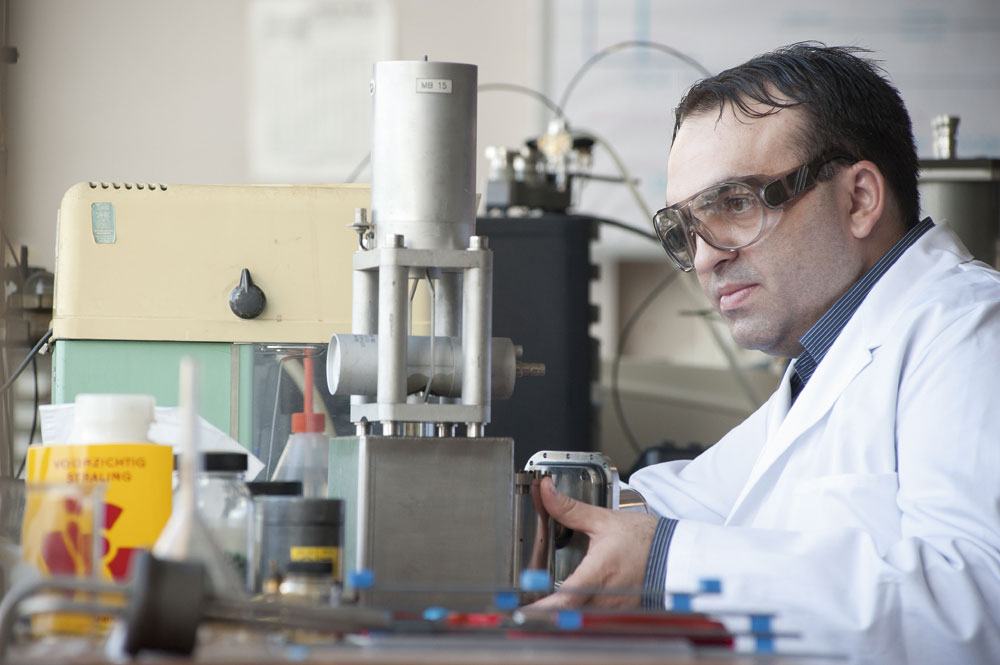Modest as it may be, the Mössbauer lab at the Reactor Institute does what no other Dutch lab can: it shows chemical catalysts in action under industrial conditions.
This unique feature is what brought chemical researchers Hirsa Torres
Galvis (MSc) and Professor Krijn de Jong from Utrecht University here. They wanted to improve their understanding of the iron nanoparticle catalysts they’re developing, in order to make short hydrocarbons, called lower olefins, from biomass. These lower olefins function as a base chemical for the production of plastics, cosmetics and drugs. The work done by the team opens up the possibility of using sustainable feedstock for the chemical and pharmaceutical industries, instead of fossil oil. And that generated a lot of interest. The Utrecht team published their results in last week’s Science magazine. Among the article’s authors is the name of Dr Iulian Dugulan, from the Reactor Institute Delft.
As Dugulan (Applied Sciences) shows us the lab with lead-shielded benches, he says that the current measurements are being done for Shell. They are studying the catalytic conversion of synthesis gas into cleaner liquid fuels. Because of the gamma rays involved, the interview will be conducted elsewhere.
The key technology here is called Mössbauer spectroscopy. It is based on a discovery by the German physicist, Rudolf Mössbauer, in 1958 (Nobel Prize 1961), which found that gamma rays could be used ‘as a probe to observe the effects of interactions between a nucleus and its electrons and those of its neighbours’ (Wikipedia). In other words: high energy gamma photons probe the energy differences that derive from different chemical bindings in astonishing resolution. Too complicated to explain in any detail here, Dugulan says that Mossbauer spectroscopy “shows the catalysts at work”.
When gamma rays are sent through a sample, the energy spectrum of the transmitted radiation is like a fingerprint that allows identification of the catalyst in use. “It gives you information on the structural properties of the sample, on the oxidation state and on the magnetic properties of the metal particles”, Dugulan explains. To a bystander, the narrow dips in the spectrum may not seem like much; however, an expert sees how active a catalyst is and how it degrades by sintering, poisoning or carbon deposition. “Only if we understand how a new catalyst works, can we improve its performance,” Dugulan concludes.
Hirsa M. Torres Galvis et. al., ‘Supported Iron Nanoparticles as Catalysts for Sustainable Production of Lower Olefines’, Science, 17 February 2012
Dominique Biever doet ook aan veldvoetbal, maar zijn voorliefde gaat zonder meer uit naar de indoorvariant. “Zaalvoetbal is mijn grootste passie. Je bent continu actief, vaak aan de bal.” De masterstudent werktuigbouwkunde noemt zichzelf een ‘voetballer van nature’. Voor zijn TU-tijd speelde hij, op het veld, bij Leek Rodenburg. Daarnaast werkte hij ook als speaker bij zaalvoetbalclub Leekster Eagles, dat in de eredivisie speelde. “Ik was gek op het spelletje, daarom ben ik zelf gaan zaalvoetballen. Omdat ik in Delft studeer is dat FC Tutor geworden. Toen ik lid werd speelden ze eerste divisie, hoog landelijk niveau. Dat trok mij ook wel aan.”
In zijn derde seizoen bij Tutor staat hij afwisselend in het eerste of tweede, zoals hij ook bij veldvoetbalvereniging Ariston’80 tegen het eerste aanhangt.
Zijn hoogtepunt bij FC Tutor was zijn debuut in het eerste, twee seizoenen geleden. “Ik mocht de laatste zeven wedstrijden meespelen. Ik was de eerste keer super nerveus, maar het ging best goed. Mooi dat het lukte, al verloren we nipt. Jammer genoeg degradeerden we dat jaar uit de eerste divisie.”
Hij is blij met de vervanging van de ‘stuiterbal’ een aantal jaren geleden door de door velen verfoeide, veel zwaardere ‘plofbal’. “Die plofbal past juist goed bij het spel. Omdat hij laag bij de grond blijft heb je minder tijd nodig om ‘m te controleren. Zo krijg je automatisch een hoger tempo.”
Het bevalt hem goed bij FC Tutor, waarvan hij ook secretaris is. “Een leuke groep mensen in het bestuur, leuke club. Gezellig wat drinken na afloop. Alleen jammer dat we niet wat meer zaaltrainingsuren hebben”, aldus de man die wekelijks vijf keer met zijn sporttas naar training of wedstrijd gaat. “Ik ga er nooit met tegenzin naartoe.” Biever leeft voor zijn sport. “Ik probeer zo gezond mogelijk te eten, ren niet snel naar de snackbar. Ik pas mijn studieplanning aan op het voetballen. Die studie gaat op zich goed, ik haal goede cijfers.”
Hij is verdediger, maar niet iemand die op het veld naar eigen zeggen keiharde overtredingen maakt. “Ik vind het niet erg om er af en toe pittig in te gaan, maar eigenlijk ben ik best een nette voetballer. Dat vind ik het mooie aan voetbal: om als verdediger de bal te hebben en dan voetballend een oplossing te zoeken. Ik ben fanatiek, wil winnen. Als die bal rolt ga ik er altijd voor. Ik blijf de hele wedstrijd gaan.”
Heeft hij het niet zwaar tijdens de zomerstop? “Buiten het seizoen doe ik aan zwemmen en hardlopen, om fit te blijven. Maar voetballen is dé sport voor mij. Ik ben een sportief type, kan niet zonder sport.”



Comments are closed.